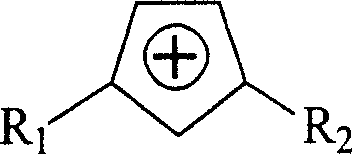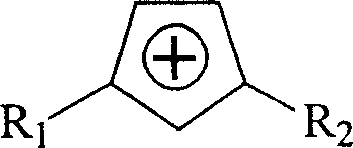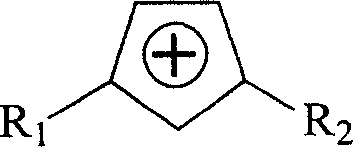Method of preparing cellulose hydrogel
A technology of cellulose hydrogel and cellulose is applied in the field of preparation of cellulose hydrogel to achieve the effects of reduced cost, non-toxic cost and loose storage conditions
- Summary
- Abstract
- Description
- Claims
- Application Information
AI Technical Summary
Problems solved by technology
Method used
Image
Examples
Embodiment 1
[0031] Add 0.8 parts of vacuum-dried wood pulp cellulose into 100 parts of vacuum-dried 1-allyl-3-methylchloroimidazolium salt ionic liquid, heat to 100°C, stir and dissolve for 30 minutes, and obtain transparent and uniform fibers Prime ionic liquid solution; the solution is cooled to room temperature and then poured into a polytetrafluoroethylene mold. After the liquid level of the solution is stable, slowly add a replacement solution configured with water and dimethyl sulfoxide at a volume ratio of 1:1 to cover the Above the cellulose / ionic liquid solution, let the replacement solution and the ionic liquid replace for 10 hours. After forming a gel with a certain hardness, pour out the upper liquid, and replace it with a new replacement solution again. After 3 such replacements , the ionic liquid in the gel was exchanged to obtain a white translucent gel. At this time, the gel was taken out and immersed in a tris buffer solution with a concentration of 0.01 mol / L for 3 hours...
Embodiment 2
[0033] Add 0.1 part of vacuum-dried microcrystalline cellulose to 100 parts of vacuum-dried 1-allyl-3-methyl imidazolium acetate ionic liquid, heat to 70°C, stir and dissolve for 20 minutes to obtain transparent and uniform fibers Elemental ionic liquid solution; the solution is cooled to room temperature and then poured into a polytetrafluoroethylene mold. After the liquid level of the solution is stable, slowly add pure water replacement solution to cover the top of the cellulose / ionic liquid solution, and let the pure water Replace the replacement solution with the ionic liquid for 5 hours. After forming a gel with a certain hardness, pour out the upper liquid, and replace it with a new pure water replacement solution. After 4 times of such replacement, the ionic liquid in the gel is After replacement, a white translucent gel can be obtained. The gel obtained in this example has higher transparency, lower mechanical strength and higher toughness.
Embodiment 3
[0035] Add 4 parts of vacuum-dried microcrystalline cellulose into 100 parts of vacuum-dried 1-allyl-3-methyl imidazolium acetate ionic liquid, heat to 110°C, stir and dissolve for 60 minutes, and obtain transparent and uniform fibers Elemental ionic liquid solution; the solution is cooled to room temperature and then poured into a polytetrafluoroethylene mold. After the liquid level of the solution is stable, slowly add pure water replacement solution to cover the top of the cellulose / ionic liquid solution, and let the pure water Replace the replacement solution with the ionic liquid for 10 hours. After forming a gel with a certain hardness, pour out the upper liquid, and replace it with a new pure water replacement solution again. After two such replacements, put the gel into the ultrasonic generator. In the device, it was replaced under the action of ultrasonic waves for 3 times, each time for 20 minutes, at this time, the ionic liquid in the gel was replaced to obtain a whi...
PUM
 Login to View More
Login to View More Abstract
Description
Claims
Application Information
 Login to View More
Login to View More - R&D
- Intellectual Property
- Life Sciences
- Materials
- Tech Scout
- Unparalleled Data Quality
- Higher Quality Content
- 60% Fewer Hallucinations
Browse by: Latest US Patents, China's latest patents, Technical Efficacy Thesaurus, Application Domain, Technology Topic, Popular Technical Reports.
© 2025 PatSnap. All rights reserved.Legal|Privacy policy|Modern Slavery Act Transparency Statement|Sitemap|About US| Contact US: help@patsnap.com



